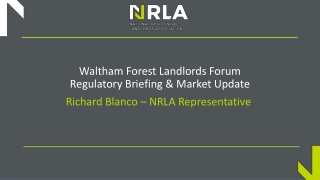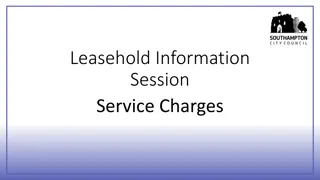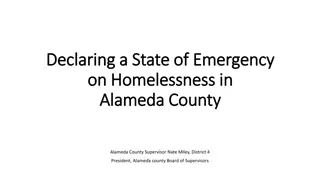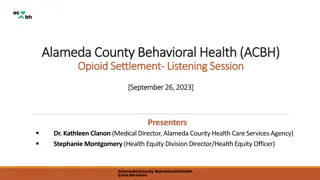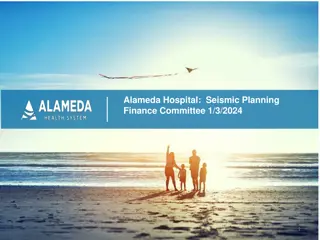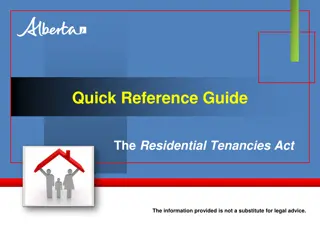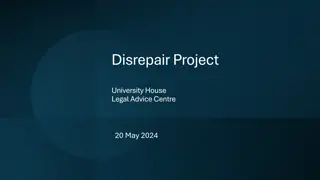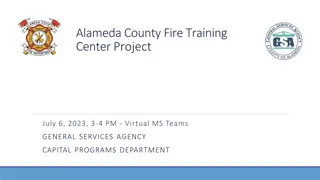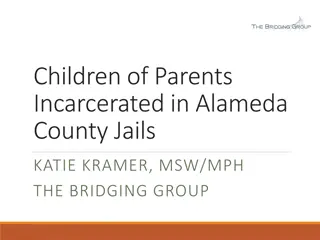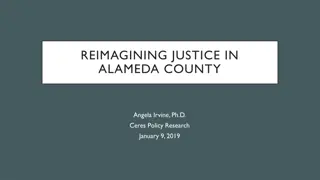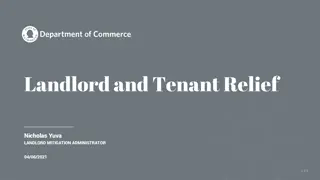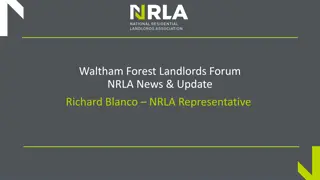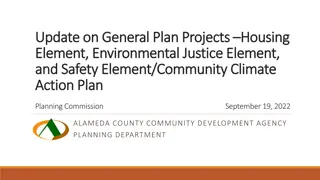The Legal Landscape for Landlords in Alameda County
Exploring the unique challenges faced by landlords in Alameda County, particularly in Berkeley, regarding eviction moratoriums, tenant protections, and rental assistance. The presentation by Attorney Daniel Bornstein covers key aspects such as unlawful detainer actions, state laws, and the impact of the pandemic on landlord-tenant relationships in the region.
Download Presentation

Please find below an Image/Link to download the presentation.
The content on the website is provided AS IS for your information and personal use only. It may not be sold, licensed, or shared on other websites without obtaining consent from the author.If you encounter any issues during the download, it is possible that the publisher has removed the file from their server.
You are allowed to download the files provided on this website for personal or commercial use, subject to the condition that they are used lawfully. All files are the property of their respective owners.
The content on the website is provided AS IS for your information and personal use only. It may not be sold, licensed, or shared on other websites without obtaining consent from the author.
E N D
Presentation Transcript
The legal landscape for landlords in Berkeley and throughout Alameda County Presented by: Daniel Bornstein, Esq. DRE #01517095, #01517094 Questions? Email daniel@bornstein.law
On the agenda: Overview of Alameda County s eviction moratorium When - and when not - an unlawful detainer (eviction) action can be commenced Alameda County Supervisor s stance on the moratorium and willingness to revisit it Judicial challenge to Alameda County s eviction moratorium Special protections afforded to Berkeley renters Tenant buyout agreements A glimpse into state laws being proposed in Sacramento
Alameda County and Los Angeles are on an island when it comes to eviction protections As the pandemic recedes, most of California has largely returned to a state of normalcy in how we manage landlord-tenant relationships. Not Alameda County. Alameda County and Berkeley is an aberration, but help may soon be on the way.
The deadline to apply for state rental assistance has seemingly passed
Compare and contrast California to that of Alameda County: Here is the state law Landlord cannot file an unlawful detainer action prior to July 1, 2022, if all of the following criteria exist: Unlawful detainer is based on amounts due prior to April 1, 2022 Tenant moved in prior to October 1, 2021 Rental assistance application is pending Application was filed on or prior to March 31, 2022 Landlord is able to file an unlawful detainer action if any of the following is correct: Unlawful detainer is based on rent amounts due on or after April 2022 The tenant moved in on or after October 1, 2021 There is no rental assistance application in the queue AND proper notice to pay is served on the tenant AND The tenant fails to cure the notice
Renters in Alameda County are protected by the Countys eviction moratorium in all eviction cases except for those impacting health and safety - until - after the expiration of the local health emergency, which remains in place and there is no end in sight. This applies to tenants living in the cities of Alameda, Albany, Berkeley, Dublin, Emeryville, Fremont, Hayward, Livermore, Newark, Oakland, Piedmont, Pleasanton, San Leandro, and Union City as well as the unincorporated areas of Ashland, Castro Valley, Cherryland, Fairview, San Lorenzo, and Sunol.
We are encouraged that the Alameda County Board of Supervisors are open to revisiting the moratorium and decoupling the ban from the local state of emergency. At least two lawmakers share the sentiment that the county's eviction moratorium should be lifted or tweaked, including Supervisor Nate Miley, who has been outspoken on this subject. Miley noted that some of the landlords he counts as constituents - many of them small mom and pops - have not been paid for over two years.
For those landlords drowning in rent debt, help may be on the way in the form of a lawsuit challenging Alameda County s draconian eviction moratorium This type of litigation may take a while to unfold. While a stay was requested, it was not granted. Contrast this with a challenge to San Francisco s 10-day warning period before serving a 3-day notice. The lawsuit may serve to motivate the Supervisors to come to their senses and take action to align Alameda County law with the rest of California. Our coalition of mom-and-pop property owners filed this lawsuit as a last resort option to ensure they don t end up in financial ruin and to regain control of the properties they worked so hard for to purchase Small mom-and-pop property owners have endured two years of not receiving rental payments. As a result, they are now on the brink of foreclosure and bankruptcy. ~ Joe Arellano, spokesperson for the Oakland-based nonprofit Housing Providers of America, one of the plaintiffs in the case.
If Alameda County renters cannot be transitioned out for nonpayment of rent, what are other grounds for eviction? Imminent threat to public health and safety A government order to vacate the building (building red tagged ) Forcible detainer action when no landlord-tenant relationship exists and thus, is not subject to the moratorium
Under a properly drafted tenant surrender of possession agreement, the tenant agrees to voluntarily vacate the premises in exchange for compensation, a rent waiver, return of the security deposit, or any mixture of incentives. With few other options at the disposal of Alameda County landlords, tenant buyout agreements have become all the more attractive. More than cash for keys, landlords get a complete release of legal claims. Berkeley landlords must provide tenants with a written disclosure of tenants' rights prepared by the Rent Board prior to making a buyout offer. Berkeley tenants have the right to rescind any buyout agreement at any time during the first 30 days after all parties sign. Mandatory language on the right to rescind must be included in the agreement itself. After the 30-day window to rescind has expired, the landlord must file the buyout agreement with the Rent Board
items our our office needs to provide clients with a draft surrender of possession agreement, within receipt of the following information: 1. Names of Owner (s) 2. Names of Tenants and/or Occupants 3. Address of Rental Unit 4. When are the tenants vacating the unit? 5. How much are you paying them? 6. When are you going to pay them (upon signing settlement agreement or upon giving the keys to you? 7. Are the tenants going to continue to pay rent for the duration of their time in the rental unit, or is the rent waived? 8. Are you returning the security deposit according to law, or are the tenants forfeiting the security deposit?
Moving on to what is cooking under the dome of the state capitol
State legislation being floated: SB 1324: Would require landlords to register as debt collectors before attempting to collect COVID- reated rent debt.By treating unpaid rent as consumer debt, landlords would have to abide by certain rules designed to prevent harassment of the debtor. AB 1791: Would create an annual $500 excise tax on all residential units to fund affordable housing. AB 2710 would prohibit owners from putting properties up for sale until advanced notice is made to "qualified entities" (tenant organizations, community land trusts and affordable housing nonprofits) that in turn, would have the first right to purchase the property and enjoy nearly one year to secure financing. Anti house-flipping legislation of AB 1771 would create a 25% tax on capital gains realized within three years of buying it, with the tax phased out the longer the property is owned. AB 2050 continues the assault on the Ellis Act by prohibiting rental housing providers to terminate tenancies and exit the landlording business until all owners have had their ownership stake for at least five years. AB 2469: Fourth attempt to institute a statewide rent registry that would require landlords to peel back the books and volunteer reams of information about their rental business. On a more positive note, SB 1133 reforms anti price-gouging laws when emergency declarations are declared wholly unrelated to housing demand.
Get in touch. Tel: 415-409-7611 Email: daniel@bornstein.law Stay in touch. bornstein.law/subscribe facebook.com/bornsteinlaw









